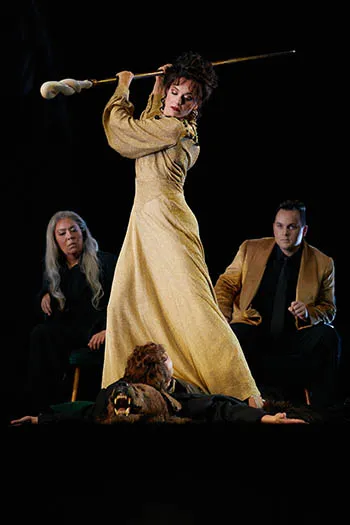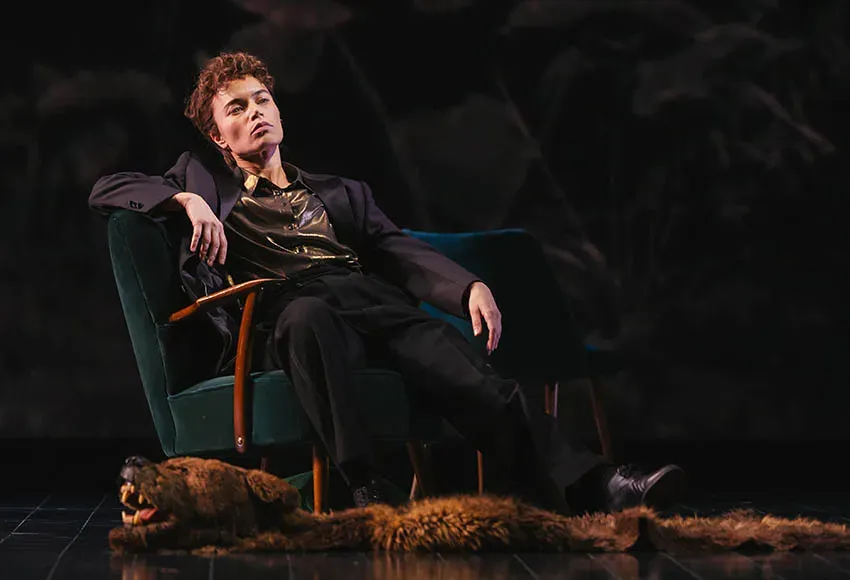ALCINA
Music by George Frideric Handel
Libretto by Antonio Fanzaglia
Seattle Opera
McCaw Hall, Seattle Center
Opening weekend (October 14 and 15)
Most of us know George Frideric Handel primarily as composer of the oratorio Messiah, but he wrote hundreds of other works, including 42 operas, many of them rarely performed in the United States. However, interest in those is increasing, partly because of the influence of today's Queer liberation movement.
In the program notes for the current, first-ever Seattle Opera production of Handel's Alcina, Joshua Gailey writes, "Although cross-dressing was a common attribute of 17th- and 18th-century opera seria [serious opera], the level of gender play in Alcina is nonetheless striking for modern audiences, and has even led some reviewers to regard Handel as the queerest of opera composers." Music to our ears, no?
In Handel's time, the character Ruggiero, the male lead of Alcina, would have been played by a castrato, a male singer castrated before puberty to keep his voice high. Mercifully, that practice was outlawed in the 19th century, and today this character is played by either a mezzo-soprano (a woman with a vocal range lower than that of a soprano) or a countertenor (a man with a vocal range higher than that of a tenor). In Seattle Opera's production, countertenor Randall Scotting plays Ruggiero.

The story of Alcina centers on the female character Bradamante (mezzo-soprano Ginger Costa-Jackson) successfully disguising herself as her brother Ricciardo while searching for her fiancé Ruggiero, who has been bewitched by the powerful sorcerer Alcina (soprano Vanessa Goikoetxea). Confusion ensues as Bradamante attracts the amorous attention of Alcina's sister Morgana (coloratura soprano Sharleen Joynt).
This production includes another gender switch: the bass role of Melisso, protector of Bradamante, becomes the mezzo-soprano role of Melissa (Nina Yoshida Nelsen).
Aria after aria
Alcina is basically a string of gorgeous arias, with a short ensemble piece at the beginning and another at the end. There isn't much plot, just some moody, lustful, obsessively jealous characters falling in and out of love with each other instantly and repeatedly. It's enough to give a person whiplash.
Handel's arias present an extreme challenge, requiring exceptional vocal agility and control. Normally, Seattle Opera double-casts major roles, to give singers a chance to rest their voices between performances. Presumably for financial reasons during this period of recovery from the pandemic, only one cast was engaged for Alcina. I was amazed to hear these singers pull off such demanding vocal feats two days in a row during opening weekend.
The most compelling performance was that of Costa-Jackson, who sang splendidly and acted with great intensity and focus; her butch demeanor was unusually convincing. Goikoetxea also lit up the stage with her vocal fireworks and combination of allure, ferocity, and finally despair. Both Costa-Jackson and Goikoetxea have already sung well in a number of Seattle Opera productions, and I consider their opening-weekend performances in Alcina their best so far.
Joynt's performance as the hapless Morgana was excellent overall, marred only by a few harsh high notes. As Morgana's even more hapless fiancé Oronte, John Marzano deployed a sweet, versatile tenor voice. Melissa is a relatively small role, but Yoshida Nelsen sounded so beautiful in her one aria that I wished she had more than one.
The vocal performance of Scotting was uneven, with frequent intonation problems. It occurred to me that the gender-bending aspect of Alcina would be even more interesting with a mezzo-soprano playing Ruggiero.
Brava, maestra!
Christine Brandes, who excelled as a singer in a number of past Seattle Opera productions, now excels as a conductor. Baroque music is notoriously difficult to play and conduct, but Brandes and a superb ensemble of Seattle Opera musicians made it look and sound easy. "The music is so clean," said my companion.
Some of the most memorable arias in Alcina are the slow ones, in which the singer is accompanied by only a few instruments. The violin and cello soloists did full justice to these lovely passages, as did John Lenti on baroque guitar and theorbo (a lute-like instrument with an insanely long neck) and flutists Jeffrey Barker and Bridget Pei. A brief mention of hunting occasioned a spirited horn duet played by Jeffrey Fair and Danielle Kuhlmann.
Minimalist production
Stage director Tim Albery, who originated this production last year at the British company Opera North, keeps the drama from becoming completely static by filling each aria with action. There's nothing wrong with adding action, but it has to make sense. I lost count of how many times someone picked up a sword and then put it down without using it. Lights descended almost to the floor and then rose again. When characters became upset, they moved chairs around the stage. Toward the end of the opera, they removed clothing while singing; in some cases, they then put the clothing back on. Oronte, who had stripped to his skivvies, set a small fire for no apparent reason.
The minimalist set – chairs, a bear rug, and video projections – looked cheap. When an audience member asked Albery about the set, he said, "We created it at a time when we had no money." He also said he was a "less is more" kind of director.
In spite of the deficiencies in the production, Alcina is worth attending for wonderful music, remarkable performances, and delightful gender play.
Performances through October 28. For more information and to purchase tickets, visit https://www.seattleopera.org


